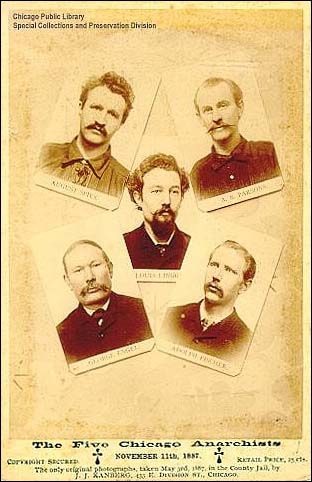
"On 1st May, 1886 a strike was began throughout the United States in support a eight-hour day. Over the next few days over 340,000 men and women withdrew their labor. Over a quarter of these strikers were from Chicago and the employers were so shocked by this show of unity that 45,000 workers in the city were immediately granted a shorter workday.
The campaign for the eight-hour day was organised by the International Working Peoples Association (IWPA). On 3rd May, the IWPA in Chicago held a rally outside the McCormick Harvester Works, where 1,400 workers were on strike. They were joined by 6,000 lumber-shovers, who had also withdrawn their labour. While August Spies, one of the leaders of the IWPA was making a speech, the police arrived and opened-fire on the crowd, killing four of the workers.
The following day August Spies, who was editor of the Arbeiter-Zeitung, published a leaflet in English and German entitled: Revenge! Workingmen to Arms!. It included the passage: "They killed the poor wretches because they, like you, had the courage to disobey the supreme will of your bosses. They killed them to show you 'Free American Citizens' that you must be satisfied with whatever your bosses condescend to allow you, or you will get killed. If you are men, if you are the sons of your grand sires, who have shed their blood to free you, then you will rise in your might, Hercules, and destroy the hideous monster that seeks to destroy you. To arms we call you, to arms." Spies also published a second leaflet calling for a mass protest at Haymarket Square that evening.
On 4th May, over 3,000 people turned up at the Haymarket meeting. Speeches were made by August Spies, Albert Parsons and Samuel Fielden. At 10 a.m. Captain John Bonfield and 180 policemen arrived on the scene. Bonfield was telling the crowd to "disperse immediately and peaceably" when someone threw a bomb into the police ranks from one of the alleys that led into the square. It exploded killing eight men and wounding sixty-seven others. The police then immediately attacked the crowd. A number of people were killed (the exact number was never disclosed) and over 200 were badly injured.
Several people identified Rudolph Schnaubelt as the man who threw the bomb. He was arrested but was later released without charge. It was later claimed that Schnaubelt was an agent provocateur in the pay of the authorities. After the release of Schnaubelt, the police arrested Samuel Fielden, an Englishman, and six German immigrants, August Spies, Adolph Fisher, Louis Lingg, George Engel, Oscar Neebe, and Michael Schwab. The police also sought Albert Parsons, the leader of the International Working Peoples Association in Chicago, but he went into hiding and was able to avoid capture. However, on the morning of the trial, Parsons arrived in court to standby his comrades.
There were plenty of witnesses who were able to prove that none of the eight men threw the bomb. The authorities therefore decided to charge them with conspiracy to commit murder. The prosecution case was that these men had made speeches and written articles that had encouraged the unnamed man at the Haymarket to throw the bomb at the police.
The jury was chosen by a special bailiff instead of being selected at random. One of those picked was a relative of one of the police victims. Julius Grinnell, the State's Attorney, told the jury: "Convict these men make examples of them, hang them, and you save our institutions."
At the trial it emerged that Andrew Johnson, a detective from the Pinkerton Agency, had infiltrated the group and had been collecting evidence about the men. Johnson claimed that at anarchist meetings these men had talked about using violence. Reporters who had also attended International Working Peoples Association meetings also testified that the defendants had talked about using force to "overthrow the system".
During the trial the judge allowed the jury to read speeches and articles by the defendants where they had argued in favour of using violence to obtain political change. The judge then told the jury that if they believed, from the evidence, that these speeches and articles contributed toward the throwing of the bomb, they were justified in finding the defendants guilty.
All the men were found guilty: Albert Parsons, August Spies, Adolph Fischer, Louis Lingg and George Engel were given the death penalty. Whereas Oscar Neebe, Samuel Fielden and Michael Schwab were sentenced to life imprisonment. On 10th November, 1887, Lingg committed suicide by exploding a dynamite cap in his mouth. The following day Parsons, Spies, Fisher and Engel mounted the gallows. As the noose was placed around his neck, Spies shouted out: "There will be a time when our silence will be more powerful than the voices you strangle today."
Many people believed that the men had not been given a fair trial and in 1893, John Peter Altgeld, the new governor of Illinois, pardoned Oscar Neebe, Samuel Fielden and Michael Schwab."
www.spartacus.schoolnet.co.uk/USAhaymarket.htm�
search Google for Haymarket�
search Google for Labour Day